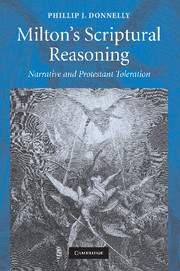Book contents
- Frontmatter
- Contents
- Preface and acknowledgments
- Abbreviations and editions
- 1 Introduction: Scriptural reasoning
- PART I SCRIPTURAL REASONING IN MILTON'S PROSE
- PART II BIBLICIST RHETORIC AND ONTOLOGY IN PARADISE LOST
- Part II introduction
- 4 Divine justice and divine filiation
- 5 Divine kingship
- 6 Rational battle
- 7 Rational allegory and gender
- PART III BIBLICIST POETICS AND HERMENEUTIC ETHICS
- Notes
- Subject index
- Index of Scripture references
Part II introduction
Published online by Cambridge University Press: 04 September 2009
- Frontmatter
- Contents
- Preface and acknowledgments
- Abbreviations and editions
- 1 Introduction: Scriptural reasoning
- PART I SCRIPTURAL REASONING IN MILTON'S PROSE
- PART II BIBLICIST RHETORIC AND ONTOLOGY IN PARADISE LOST
- Part II introduction
- 4 Divine justice and divine filiation
- 5 Divine kingship
- 6 Rational battle
- 7 Rational allegory and gender
- PART III BIBLICIST POETICS AND HERMENEUTIC ETHICS
- Notes
- Subject index
- Index of Scripture references
Summary
As we begin the second part of this study (Chapters 4–7) and shift our focus from Milton's prose to his major poetry, we shall not abandon his prose, but neither shall we presume that it offers merely an explicit formulation of what he says more obscurely in his poetry. We shall continue to notice the connections between the claims that make up the network of “discursive” reasoning we have traced in Milton's prose, which includes the “ethico-cognitive” sense of reason as conscience, or “right reason.” Our primary focus, however, now turns to what I call Milton's “Christo-poetic” reasoning: that is, the indirect ways he deploys Scripture to intimate that his claims regarding ontology, anthropology, virtue, and civil society are actually intrinsic to divine self-revelation, the center of which is the Son, or the divine Logos, who is both Ratio and Oratio. Against the modern view that reason is merely a calculative capacity, the purpose of which is to master fortune, Milton posits that human reason enables participation in creation's gratuitous goodness. As Chapters 2 and 3 have shown, Milton's view of human reason arises from his two-fold belief that Divine Reason, or the Son, is the poetic gift of peaceful difference from the Father who enables creation's being, and that humans, in turn, are made in the image of God revealed in the Son.
Information
- Type
- Chapter
- Information
- Milton's Scriptural ReasoningNarrative and Protestant Toleration, pp. 73 - 76Publisher: Cambridge University PressPrint publication year: 2009
